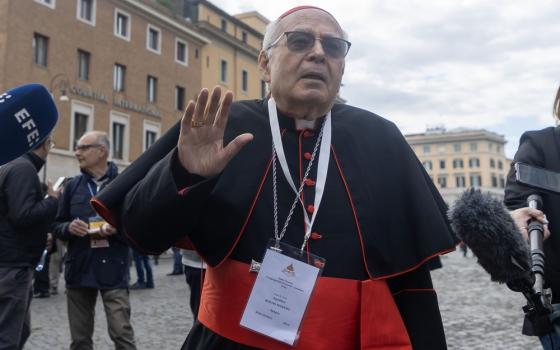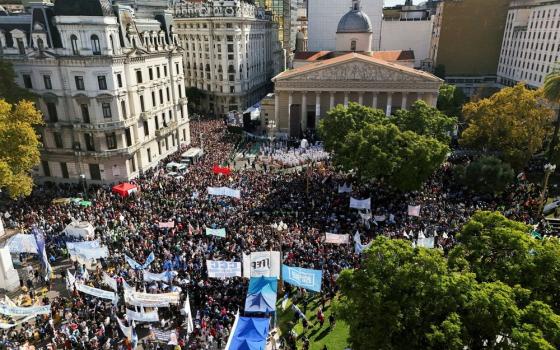The USCCB can cause quite a stir when it wants to. Last year, in the struggle against the
Now, the bishops have turned their sights to comprehensive immigration reform. Here is an issue which, like religious liberty, garners nearly universal support among the bishops. On a conference call last week with reporters, Cardinal Timothy Dolan, Archbishop Jose Gomez and Bishop John Wester were all very strong in making the case for immigration reform. Dolan called the effort to derail reform based on the fact that the bombing suspects in Boston were immigrants “illogical” and “unjust.” Gomez spoke repeatedly, and passionately, about bringing people out of the shadows: One guesses that as archbishop of Los Angeles, Gomez has visited those shadows and met with those people who live there repeatedly, and developed a pastor’s concern for them. And, Bishop Wester, whom I have never encountered before, was very impressive, not least in explaining why only a comprehensive solution would work.
The question is: What’s next? The Justice for Immigrants campaign has done a good job of educating Catholics about the issue, but will there now be bulletin inserts to convince the rest? Will we hear sermons on the issue? Will the bishops be meeting with those members of Congress who oppose immigration reform, including many prominent Catholics? I am waiting to hear if those Catholics who are quick to suggest denying communion to pro-choice politicians will voice the same opinion regarding the fitness of Cong. Steve King of Iowa or Cong. Lou Barletta of Pennsylvania to approach the communion rail. To be sure: I do not think anyone should be denied communion, but if the issue is going to be raised, surely it should be raised in an even-handed way.
Will the Knights of Columbus work with its members to lobby on the issue? The Knights produced busloads of Catholics to march on the state capitol in Hartford, Connecticut, when a bill was introduced calling for reorganizing the state’s incorporation laws for churches, a bill that had precisely zero chance of being enacted, but which made for good political theater. Last year the Knights talked about the Cristeros in Mexico, and the issue of religious persecution, even producing a movie on the subject: Will they mount a similar effort to highlight Mexican immigrants today? Will the Knights challenge Republican opponents of immigration reform?
On the conference call last week, all three bishops spoke to the role the Church has played in the process of inculturation, the way our parishes and schools help a newly arrived immigrant get her feet under her, our English as a Second Language courses, and other ways we help immigrants become Americans while, of course, holding onto what is best in their ethnic heritage. I think we should go a bit further. One of the problems with the compromise proposal coming from the Gang of 8 is that the waiting times to become a citizen are too long and the fees are too high. But, as President Obama warned Latino advocates in a meeting this week, tinkering with the compromise proposal could backfire. I pointed this out yesterday in regard to the issue of same sex couples. The same holds with other parts of the bill that we wish could be made more humane. We want the best bill that can pass Congress, which will not be the same thing as the best bill period. So, instead of risking the loss of key Republican senators but lowering the fees undocumented workers must pay to regularize their status, I suggest that the bishops vote at their November meeting to take up a special collection at all parishes for the next three years to raise the money to pay the fees. The effort could be easily made interdenominational and have collections in evangelical and other churches too.
Another issue the bishops addressed on the call was the need to examine the root causes of immigration in U.S. foreign policy. Here is a very hopeful avenue for working with the Obama administration. Secretary of State John Kerry, after dealing with hot spots around the globe, might relish a chance to deal with the less fraught intra-American issues. With Americans still mired in a sluggish recovery, it might be hard to get government funding for a new program of targeted aid for Latin America, but what if the U.S. bishops encouraged every parish to team with a parish in Latin America? My home diocese of Norwich, Connecticut has a long relationship with the island of Haiti: Why does not every diocese pair with a diocese in Latin America to send the help we can give, learn more about the problems the people there face, and, not unimportantly, fulfill the mandate Pope Francis has given us of being a Church “for the poor.” And, unless anyone think that this is a one way street, I suspect that U.S. Catholics, with our affluence and our creature comforts, might be able to renew the strength and depth of our faith by encountering the rich Catholic traditions and heartfelt expressions of faith that one encounters south of the border.
I was disturbed to read comments yesterday about the bishops only supporting immigration reform because they are trying to fill their pews, which are losing Anglo-Catholics, with newly arrived Latinos. That is bunk. In most dioceses in America, Latinos are already here, and the bishops are being good pastors by looking out for them. The Church has always looked out for immigrants. That is who we are. And, both our country and the Church in the U.S. have been strengthened by the new energy of immigrant populations. Immigrants are almost always poor, and as Pope Francis has indicated, we Catholics need to go out and be with the poor because that is what Christ did, and, just as vital, it is among the poor that we will see the face of Christ. I hope the bishops will push, and push hard, for immigration reform. I hope activists will heed President Obama’s warning about the need to keep the fragile compromise together so that immigration reform does not go the way of gun control. And, most of all, I hope that Congress will finally bring some measure of justice to the issue of immigration.






